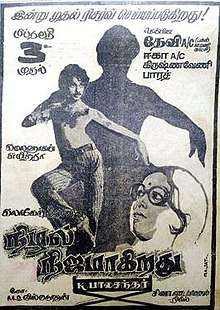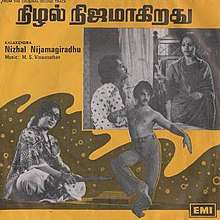Nizhal Nijamagiradhu
Nizhal Nijamagiradhu (lit. 'Illusion becomes reality') is a 1978 Indian Tamil-language feature film, directed by K. Balachander,[1] starring Kamal Haasan, Sarath Babu, Sumithra and Hanumanthu in the lead roles and introduced Sobha. It was a remake of the Malayalam film Adimakal, directed by K. S. Sethumadhavan.[2] The film was also earlier remade in Telugu as Chilakamma Cheppindi (1977), directed by Eranki Sharma, with Rajinikanth in the lead role.[3]
| Nizhal Nijamagiradhu | |
|---|---|
 Poster | |
| Directed by | K. Balachander |
| Produced by | P. R. Govindarajan J. Duraisamy |
| Screenplay by | K. Balachander |
| Based on | Adimakal by Pamman |
| Starring | Kamal Haasan Sumithra Sobha Sarath Babu |
| Music by | M. S. Viswanathan |
| Cinematography | B. S. Lokanath |
| Edited by | N. R. Kittu |
Production company | Kalakendra Movies |
| Distributed by | Kalakendra Movies |
Release date |
|
| Country | India |
| Language | Tamil |
Plot
Venkatachalam (Sarath Babu) and Indumathi (Sumithra) are siblings. Indumathi hates men and she is adamant that she will never get married. Sanjeevi (Kamal) is a friend of Venkatachalam and often visits his house. Sanjeevi likes Indumathi's attitude and starts teasing her many times, they often quarrel as well. Though Indumathi too starts liking him, she is too egotistical to show her romantic side to Sanjeevi as she doesn't want to remove her stubborn attitude "mask".
Thilagam (Sobha) is a young girl from the village who comes to work as a servant in Venkatachalam's house. Her innocence draws Venkatachalam towards her and they get intimate. She becomes pregnant, but Venkatachalam refuses her. Thilagam is driven out of Venkatachalam's house and gets support from Sanjeevi and Kasi (Hanumanthu), a person who is hard of hearing, who also worked at Venkatachalam's house and has affection towards Thilagam. Sanjeevi provides Thilagam with lodging and requests Kasi to stay with her and look after her. Thilagam delivers a child.
Months later, after Sanjeevi and Kasi appealed to his conscience, Venkatachalam repents and is ready to accept Thilagam, but she decides to live her life with Kasi, who took care of her during her pregnancy. Indumathi, meanwhile, throws away her "stubborn" mask and asks Sanjeevi to accept her. Sanjeevi accepts her love.
Cast
- Kamal Haasan as Sanjeevi
- Sumithra as Indumathi
- Sobha as Thilagam
- Sarath Babu as Venkatachalam
- Hanumanthu as Kasi
- T. S. B. K. Moulee as Manmatha Naidu
- Oru Viral Krishna Rao as Kalimuthu
- M. S. Sundari Bai as Ponnamma
- K. Natraj as Ayyavu
Production
Sarath Babu was given a role in the film, after Balachander saw him at a function. His first shot was at Hyderabad.[4] Balachandar cast Malayalam actress Shoba in a pivotal role in the film, but the delayed release of the film meant that Karaikkudi Narayanan's Achaani (1978) marked Shobha's debut as a lead actress in Tamil. Balachander gave T. S. B. K. Moulee, who had directed films under Balachander's banner, the role of a "women-obsessed local tattler".[5] Balachander, who used to watch Moulee's plays, liked his style of writing and wanted him to write a comedy track for the film. Mouli said that he was given the liberty by Balachander to insert comedy sequences wherever he wanted and that he wrote 16 scenes for the film.[6]
Balachander stated that he had an egotistical girl (Sumitra) fall for the macho antics of the hero (Kamal Hassan) "to lend credence and strength to the plot. Also, she provided a perfect contrast to the innocent victim Shobha, the other character".[7]
Soundtrack
| Nizhal Nijamagiradhu | |||||||
|---|---|---|---|---|---|---|---|
 LP Vinyl Records Cover | |||||||
| Soundtrack album by | |||||||
| Released | 1978 | ||||||
| Genre | Feature film soundtrack | ||||||
| Length | 8:52 | ||||||
| Label | EMI | ||||||
| Producer | M. S. Viswanathan | ||||||
| |||||||
The music for this film was composed by M. S. Viswanathan.
All lyrics are written by Kannadasan.
| No. | Title | Lyrics | Singer(s) | Length |
|---|---|---|---|---|
| 1. | "Kamban Emandhaan" | Kannadasan | S. P. Balasubrahmanyam | 4:25 |
| 2. | "Ilakanam Maarudho" | Kannadasan | S. P. Balasubrahmanyam, Vani Jayaram | 4:27 |
| Total length: | 8:52 | |||
Reception
Actor Maadhu Balaji said, "I must have watched Nizhal Nijamagiradhu 40 to 50 times".[8] In 2008, actor and TV host Bosskey named Nizhal Nijamagiradhu among his three most favourite films.[9] In 2005, Kamal Haasan stated that Nizhal Nijamagirathu was far superior to Maro Charitra,[10] another Balachander film he was also part of, which was highly acclaimed and very successful.
References
- "From theatre to the big screen". The New Indian Express. 26 March 2009. Retrieved 26 February 2018.
- Nizhal Nijamagiradhu (motion picture). Kalakendra Movies. 1978. From 0:41 to 0:46.
- Bhattacharjya, Joy (10 October 2014). "Rajinikanth special". Business Line. Retrieved 5 April 2018.
- "I am a director's actor, says Sarath Babu". The Hindu. 5 October 2006. Retrieved 26 February 2018.
- "Reflections of a matinee maverick". The New Indian Express. 18 July 2010. Retrieved 26 February 2018.
- Saravanan, T. (12 June 2014). "Mouli and the moolah". The Hindu. Retrieved 26 February 2018.
- Ilangovan, R. (2 October 2013). "The KB school". Frontline. Retrieved 26 February 2018.
- Balaji, Maadhu (25 July 2008). "Why I like... Dasavathaaram". The Hindu. Retrieved 26 February 2018.
- Bosskey (27 June 2008). "Why I like... Johnny". The Hindu. Retrieved 5 April 2018.
- Shivkumar, S. (25 August 2005). "Set to score a perfect ten". The Hindu. Retrieved 26 February 2018.